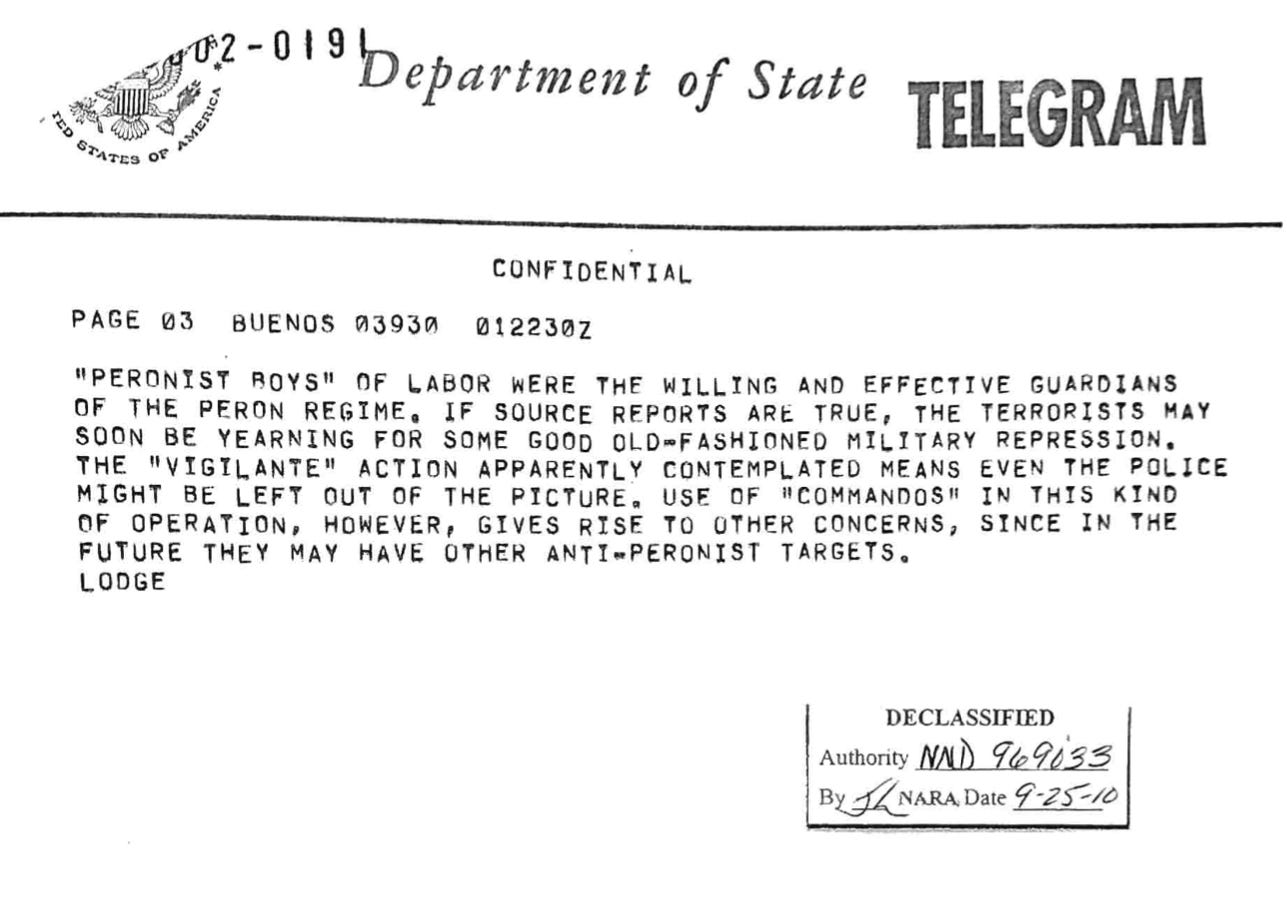Problems of democratisation
Two US Embassy documents shed some light on Peronism’s role in the origins of state terror in the 1970s
A couple of documents from the US Embassy seem particularly significant for understanding Argentina’s descent into state terrorism in the 1970s.
The first is from June 1, 1973. It describes in the week after becoming president of Argentina, Héctor Cámpora gave the green light for Peronist union bosses to form vigilante groups to deal with opposition to them in the labour movement. The conclusion of the report is particularly chilling:
For me, this suggests that the death squads that began to operate in Argentina in 1973 were not simply the brainchild of José López Rega, the deeply weird aide to Perón, who became Minister of Social Welfare under Cámpora. López Rega is typically credited with having founded the Argentine Anti-communist Alliance or Triple A. But if the intelligence reported by the US Embassy is correct, the death squads were more organic to the Peronist movement than that standard narrative suggests. Specifically, they were initially established by the union bosses, who were continuing a tradition from the Peronist governments of 1946 to 1955 – albeit in a more extreme version.
The second document then further implicates the Peronist union bosses in state terrorism. It details a meeting from March 22, 1976, two days before the coup that inaugerated the military governments of 1976 to 1983. The US Embassy reported how Peronist union bosses had met with representatives of the military to agree how the labour movement should be deradicalised. It was clear that Córdoba – where opposition to the Peronist union bosses was strongest – would be targeted with the most violence:
I am not an expert on Peronism, but my impression is that the movement has not fully understood its complicity in Argentina’s experience of state terrorism in 1970s. That complicity also illustrates how complex the problem of democratisation was in Argentina in the twentieth century. Cámpora had been elected in probably the fairest elections since the 1920s, but then immediately approved the formation of death squads. The targets of those death squads often wanted to democratise Argentine society, but they often saw the overthrow of parliamentary democracy as necessary to achieve that goal. Few from the period can be clearly identified as heroes.
I am an independent scholar, so my opportunities for funding are limited. Any donation you can make to help me write The Poor Rich Nation would be fantastic.






Regarding the first document, let's note that two months and a half after that reunion, Montoneros executed Jose Ignacio Rucci, the leader of the CGT. My reading is that open war between two Peronist factions was being declared: one, the old guard and labor leaders , the other, young leftist revolutionaries. Not even Peron himself was able to contain it. When he returned, his arrival at the airport turned into a shootout between the groups. Campora could only do so much.
The second is more interesting. Two things; the unions had been clashing and bargaining with different military dictatorships for 20 years. It probably eluded them that this time it would be different. And other groups (the Communist Party, for example) also reacted with ambivalence. The example from Velasco Alvarado (the Peruvian General) was in their minds probably.
Hi! Curious if you've found any data on taxes as a share of national income in Argentina to further your point that inability to tax elites after WW2 was a contributor to decline: and if you see increases in Australia/New Zealand, etc where tax rates did not increase in Argentina.